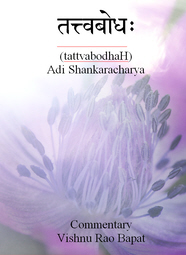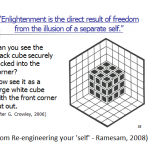 “I understand the Advaita teaching that everything is One only without a second, but I am always afraid of dogs and monkeys which are common in my place. Moreover, I also have a fear of snakes etc. as I live in a forest area.
“I understand the Advaita teaching that everything is One only without a second, but I am always afraid of dogs and monkeys which are common in my place. Moreover, I also have a fear of snakes etc. as I live in a forest area.
Everything is brahman and therefore, ‘fear’ is also brahman. Though my mind is convinced by the logic of Advaita, why do I suffer from various fears?”
If there is a perception of fear, it automatically implies that there is a ‘me’ as the ‘subject,’ the finite perceiver and there is the ‘other,’ an object, separated from ‘me.’ (For this analysis, we define an ‘object’ as anything that is perceived. Hence ‘fear’ is also an object). This in turn implies that I ignored my ‘Dimensionlessness’ (anantatva) and assumed finiteness to myself.
It is true that on the full understanding of the Oneness of “Whatever-That-IS,” there is no scope for any sort of ‘fear.’ After all, if all is One, and there is no second, where and who is the other to be afraid of?
We have a recent real-life example for this in the 35th Pontiff of Sringeri, Shri Abhinava Vidyatheertha Swami. He found a big cobra snake coiled around his neck when he was meditating in a remote forest area. He told his Successor: Continue reading

 Most people (or at least those who visit this website!) will be aware that the dates for Shankara’s birth and death are a trifle hazy. It is generally assumed that he lived around the ninth century A.D. and had a fairly short life, dying at around the age of 32. Fewer people will know, however, that one of the principal Maths – namely that at Sringeri – actually has his date of birth as 44 BCE. And 509–477 BCE are the dates based on records from other Maths!
Most people (or at least those who visit this website!) will be aware that the dates for Shankara’s birth and death are a trifle hazy. It is generally assumed that he lived around the ninth century A.D. and had a fairly short life, dying at around the age of 32. Fewer people will know, however, that one of the principal Maths – namely that at Sringeri – actually has his date of birth as 44 BCE. And 509–477 BCE are the dates based on records from other Maths!


